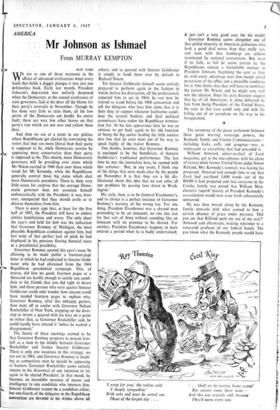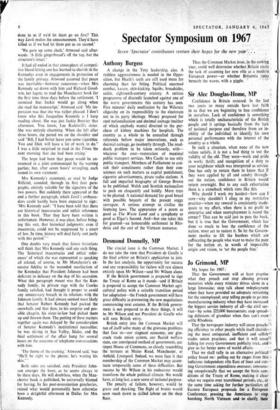Mr Johnson as Ishmael
AMERICA
From MURRAY KEMPTON
NEW YORK
WE are at one of those moments in the affairs of advanced civilisations when every
hand that holds a dagger plunges it into just one defenceless back. Early last month, President Johnson's depression was unfairly deepened when the Democrats, at the annual conference of state governors, laid at his door all the blame for their party's reversals in November. Though he has done very little to raise them, all the low spirits of the Democrats are hardly his entire fault; there are very few other leaves on that party's tree which are not sere and yellow these days.
And then we are at a point in our politics where Republicans get elected by convincing the voters that they are more liberal than their party is supposed to be, while Democrats survive by appearing more conservative than their party is supposed to be. This month, more Democratic governors will be presiding over states which Mr Nixon carried in 1960 than over those which voted for Mr Kennedy, while the Republicans generally control those big states which elect most Democratic presidents. There is, then, very little cause for surprise that the average Demo- cratic governor does not associate himself enthusiaitically with the President; it was, how- ever, unexpected that they should jostle so to divorce themselves from him.
There is every sign that, at least for the first half of 1967, the President will have to endure similar humiliations and worse. The only cheer the year's end held for him was the indication that Governor Romney of Michigan, the most plausible Republican candidate against him, had lost none of that perfect lack of pitch he had displayed in his previous fleeting biennial tours as a presidential poisibility.
Governor Romney opened this year's essay by allowing to be made public a fourteen-page letter in which he had explained to Senator Gold- water why he had abstained from the 1964 Republican presidential campaign. This, of course, did him no good; fourteen pages or a thousand are hardly enough to satisfy any candi- date or his friends that you did right to desert him; and those persons who were against Senator Goldwater could only wonder how anyone could have needed fourteen pages to explain why. Governor Romney, after this unhappy gesture, then went off to confer with Governor Nelson Rockefeller of New York, stopping on the door- step to invent a quarrel with his host on a point so minor that, as Governor Rockefeller said, he could hardly have uttered it 'unless he wanted a disagreement.'
I The theory of these openings seemed to be That Governor Rorriney proposes to present him- 'self as a man in the middle between Governor Rockefeller and former Senator Goldwater. There is only one weakness in this strategy; we are not in 1964, and Governor Romney is insult- ing as competitors men he should be appeasing as backers. Governor Rockefeller seems entirely sincere in his disavowal of any intention to try again to be elected President; in that mood, he becomes an incredible resource of means and intelligence to any candidate who interests him. Senator Goldwater cannot be a candidate either; but one-fourth of the delegates to the Republican convention are devoted to his wishes above all
others; and to quarrel with Senator Goldwater is simply to hand them over by default to Richard Nixon.
Yet Senator Goldwater himself seems entirely prepared to perform again in the fashion in which, before his distraction, all the professionals expected him to act in 1964; he can now be trusted to stand before the 1968 convention and tell the delegates who love him alone that it is their duty to support whatever loathsome candi- date the eastern bankers and their political commissars have stolen the Republican nomina- tion for. At his last appearance here he was so anxious to get back again to his old function of being the big sucker leading the little suckers into line that he even went out of his way to speak highly of the traitor Romney.
One doubts, however, that Governor Romney is equipped to be the beneficiary of Senator Goldwater's traditional performance. The last time he met the journalists here, he opened with this sentence: 'But, in any event, I think one of the things that were made clear by the people on November 8 is that they are a bit dis- illusioned about this idea that we can solve all our problems by passing laws down in Wash- ington.'
His style, then, is to be General Eisenhower's, and its choice is a perfect instance of Governor Romney's mastery of the wrong key. For one thing, President Eisenhower was a shrewd man pretending to be an innocent; no one else can try that sort of thing without sounding like an innocent with no pretence to be shrewd. For another, President Eisenhower happens to have entered a period when he is badly undervalued; it just isn't a very good year for his model.
Governor Romney seems altogether one of that pitiful minority of American politicians who look a good deal worse than they really are; and men with that handicap are seldom nominated by national conventions. But, even if he fails, as fail he seems certain to, the Republicans remain a formidable menace to President Johnson, beginning the year as they do with every advantage over him except actual possession of the office and a plausible candidate for it. One thinks that they will have to nominate the patient Mr Nixon, and he might very well win the election. Since his past disasters suggest that he, of all Americans, is alone debarred by fate from being President of the United States, the year in that case could only end with his falling out of an aeroplane on the way to his inauguration.
The ceremony of the peace settlement between those great warring sovereign powers, the Kennedy family and Cowles Communications— including kicks, cuffs and gougings—was as unpleasant as everything that had preceded it.
William Attwood, editor-in-chief of Look magazine, got to the microphones with his claim of victory while former United States judge Simon Rifkind, Mrs Kennedy's counsel, was having his processed. Attwood had enough time to say that Look had sacrificed 1,600 words out of the 80,000 it had projected and that everyone in the Cowles family was proud that William Man- chester's 'superb' history of President Kennedy's assassination would now issue forth substantially unmarred.
He was then moved along by the Kennedy family stewards with what seemed to him a certain absence of grace under pressure. Did you see that Rifkind push me out of my seat?' Attwood said afterwards, making reference to a venerated graduate of our federal bench. `Do you know what the Kennedy people would have '1 weep for you,' the walrus said, 'I deeply sympathise.'
With sobs and tears he sorted out Those of the largest size . . . . . Shell we be trotting home again?' But answer came there none And this was scarcely odd, because They'd eaten every one. done to us if we'd let them go on first? This way Look makes the announcement They'd have killed us if we had let them put us on second.'
'We gave up some slush,' Attwood said after- wards. 'A little gingerbread's off the top, but the structure's intact.'
It had all ended in that atmosphere of competi- tive blood-letting one has learned to cherish in the Kennedys even in engagements in protection of the family privacy. Attwood assumed that peace was inevitable—however rancorous—when Mrs Kennedy sat down with him and Richard Good- win, her legate, to read the Manchester book for the first time three days before the settlement. 'I surmised that Jackie would go along when she read the manuscript,' Attwood said. 'My im- pression was that she was rather pleased. I don't know who this Jacqueline Kennedy is I keep reading about. She was just Jackie Bouvier that afternoon. You know, Lee Radziwill's sister. She was entirely charming. When she left after three hours, she patted me on the shoulder and said "Bill, I had better leave you some cigarettes. You and Dick will have a lot of work to do." I was a little surprised to read in the Times the next morning that she had been crying.'
The hope had been that peace would be an- nounced in a joint communiqué by the warring parties; but, after seven hours' wrangling, each issued its own statement.
Mrs Kennedy's statement, as read by Judge Rifkind, sounded, through its first four para- graphs, entirely suitable for the signature of the two powers. But suddenly there appeared at the end a further paragraph, which Look's ambassa- dors could hardly have been expected to sign: 'Mrs Kennedy said: "I have been told that there are historical inaccuracies and unfair references in this book. That they have been written is unfortunate. However, it was clear, before bring- ing this suit, that historical judgments, even if inaccurate, could not be suppressed by a court of law. In time, history will deal fairly and justly with this period." ' One doubts very much that future historians will think that Mrs Kennedy said any such thing. The 'historical inaccuracies and unfair refer- ences' of which she was represented as speaking all related, of course, to Mr Manchester's ex- cessive fidelity to the wounded recollection of the Kennedys that President Johnson had been deficient in delicacy on the day of his accession. What this paragraph meant was that the Ken- nedy family, its private rage with the Cowles family satisfied, had thought it proper to avoid any unnecessary breach in its relations with the Johnson family. It had always seemed most likely that Senator Robert Kennedy had packed the snowballs and that then, to his surprise and pos- sible chagrin, his sister-in-law had picked them up and thrown them. The putting of these matters together again was delayed by the consideration of Senator Kennedy's institutional necessities; he was ski-ing in Sun Valley, Idaho, and the final settlement of the affair hung for several hours on the outcome of telephone conversations with him.
'The theme of the evening,' Attwood said, 'was "He'll be right to the phone; he's waxing his skis." ' Both sides are satisfied; only President John- son emerges the loser, as he seems always to be these days. He will doubtless, when the Man- chester book is published, be universally blamed for having, by his post-assassination gaucheries, ruined what would presumably have otherwise been a delightful afternoon in Dallas for Mrs Kennedy.































 Previous page
Previous page